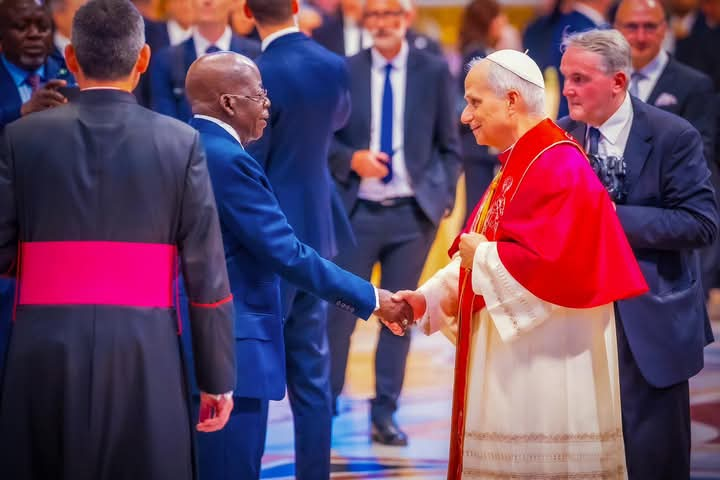*From Hired Bishops to the Pope: Tinubu’s Strange Journey of Image Redemption*
At the twilight of Nigeria’s 2023 general elections, Bola Ahmed Tinubu stood on shaky ground—not just politically, but morally. His candidacy was haunted by controversies that clung to him like a swarm of flies to overripe fruit. The election, marked by violent disruptions, voter suppression, and accusations of brazen rigging, drew sharp criticism both at home and abroad. The air was thick with discontent, and the credibility of his mandate hung by a thread.
But even more damaging than the electoral irregularities was a spectacle that quickly became the symbol of APC’s desperation: the infamous “Fake Bishops Affair.”
As part of their final push to court Christian votes—especially after Tinubu, a Muslim, chose a fellow Muslim as his running mate—the APC staged a bizarre political drama. A group of awkwardly dressed men in mismatched cassocks appeared at the unveiling of his running mate, claiming to represent Christian bishops in support of the ticket. But it didn’t take long for social media detectives to unravel the farce. The supposed bishops were unmasked as artisans—carpenters, mechanics, and petty traders—hastily costumed and coached to play a role in this political theatre of the absurd. Their identities were traced back to local workshops and street corners. It was not just embarrassing; it was emblematic of a deeper rot—the lengths to which Nigerian politicians would go to manufacture legitimacy.
Fast-forward to 2024, and the same Tinubu, now President, finds himself shaking hands with none other than the Pope. The image is surreal: the man once surrounded by fake clergy in a desperate PR stunt now being received in the holiest halls of global Christendom.
What changed?
The moment was more than symbolic. It was a studied move to cleanse an administration still battling questions of legitimacy and acceptance, especially among Nigeria’s Christian population. The handshake with the Pope served as a powerful photo-op—one of healing, diplomacy, and elevated perception. It was a transition from ridicule to reverence, or at least, the performance of it. In the theatre of politics, perception often triumphs over reality.
But this trajectory—from shaking fake bishops to standing with the Pope—tells us something profound about the state of Nigerian politics: that desperation often precedes redemption, and image can be manipulated to mask decay. It exposes how political power in Nigeria is not only pursued with ruthless cunning but is also sanitized with global optics once attained. The irony is sharp: those who fake holiness to gain power may later seek real blessings to justify it.
In the end, the fake bishop scandal may be remembered as a comedic footnote in the annals of Nigerian elections. But it also serves as a parable—a cautionary tale of how far politicians will go to gain power, and how easily global recognition can whitewash local sins. Tinubu’s handshake with the Pope is not just a redemption arc—it is a masterclass in political reinvention. But the question remains: is it also a reconciliation with the truth, or just another chapter in the gospel of optics?
*Fr Augustine Anwuchie*
